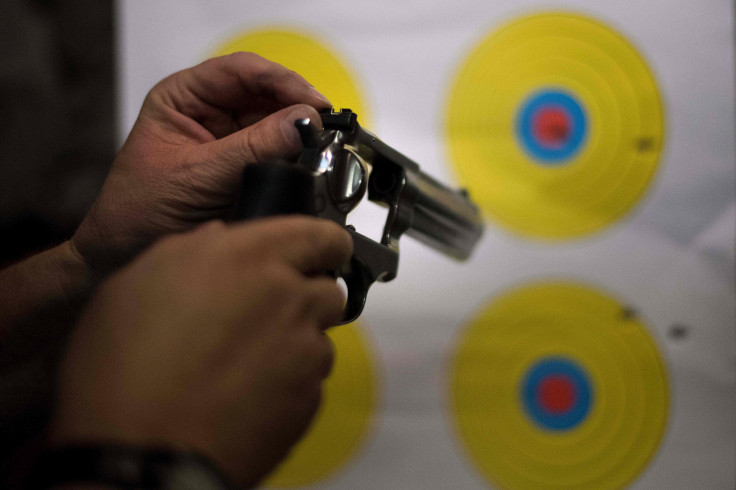Why Do Gun Sales In the US Spike After Mass Shootings?

Spike in fear and panic after mass shootings is an understandable and common phenomenon across the world. However, in the U.S., mass shootings have given way to another disturbing trend–an increase in gun sales.
According to a recent report by CNN, handgun sales rose after the San Bernardino shootings that killed 14 in December 2015 by 62 percent. Sales were also high for several months after the attack on the Pulse nightclub in Orlando in June 2016 that claimed 49 lives, climbing by almost 20 percent in June, July and August 2016.
While it is difficult to determine exactly how many gun purchases happen after a shooting due to the absence of a national registry of guns and their owners, the background checks conducted on any person purchasing a firearm from a licensed dealer provide a rough estimate of trends in gun purchasing.
Even in this scenario, there is the possibility that someone may undergo a background check to obtain a concealed carry permit as is the rule in many U.S. states, but may not actually end up purchasing a weapon. Many private sales do not require these checks and even a fail background check is considered a check.
Lacey Wallace, Assistant Professor of Criminal Justice, Pennsylvania State University, wrote in an article for the Conversation that the number of federal weapons background checks increases somewhat at the time of mass shooting s like the Virginia Tech shooting in 2007, the Northern Illinois University in 2008 and the North Carolina nursing home shooting among others.
These shootings, including the recent Las Vegas massacre, also set gun stock prices soaring, with a report stating that the stocks of firearm manufacturing companies Sturm Ruger ( RGR ) and American Outdoor Brands (AOBC) going up by 6 percent and nearly 7 percent respectively, after the Mandalay Bay shooting which killed 58 people and injured 500. CNN also reported that gun stocks also spiked after both the Pulse and San Bernardino shootings. This is thought to be because of investors betting on an increase in gun sales after the shooting.
The rise in gun sales, therefore, is what translates into a rise in stock prices, and the reason for the former is speculated to be many.
Public health expert David Studdert, a professor of law and medicine at Stanford University, told International Business Times (IBT) in an email interview that there was a mix of motivations of gun buyers at work. One of them, according to Studdert, is the fear that “the event will prompt gun control legislation that will make it more difficult to purchase weapons in the future.”
His study, published in the journal Annals of Internal Medicine in May, tracked handgun sales in California after two mass shootings: the 2012 Newtown massacre and the 2015 shooting in San Bernardino, California and found that gun sales did spike after both incidents. After Newtown, there were 53 percent more purchases than the researchers expected in California. After San Bernardino, there was a 41 percent increase across the state -- but this broke down to an 85 percent increase among San Bernardino residents, as opposed to a 35 percent increase elsewhere in the state.
Melissa Locker, writing for the Fast Company also states Studdert’s proposed paradoxical reason. According to her article in February, gun lovers’ worry that the Congress would enact some form of gun control following a mass shooting leads them to buy more guns before they are taken away.
Another reason, perhaps a widely believed one, is that buying guns after a mass shooting is a reaction of people who are concerned for their safety and want to carry arms as self-defense. “Some purchasers are motivated by elevated feelings of insecurity and concerns for personal safety,” Studdert told IBT. This pattern is also in line with surveys that have shown that for most Americans, irrespective of whether a mass shooting has taken place or not, the top reason for owning a gun is to protect themselves and their families.
Both these scenarios create urgency after mass shootings to acquire a gun, leading the said spike. Studdert also proposes a third reason: that for some, “ gun buying can also be a statement about identity and values.” However, it is not clear if this motivation is a reaction to mass shootings.
There are also other triggers, apart from mass shootings, that may lead to a spike in gun purchases. However, according to Studdert, the studies conducted to on them are limited. “In California, we see some evidence of spikes following international terrorism events, unexpected election results (federal and state). There are also signs of purchasing responses in the time after new gun control measures are passed and before they come into force. But more research is needed to fully understand these responses,” he told IBT.
The implications of gun purchases and gun ownership are obvious health risks. John Lott in his book More Guns, Less Crime, said that armed citizens increase the risk for would-be offenders, helping to prevent violent crime, stated Wallace in her article for Conversation. However, the opposite also holds true, according to Studdert, who says increased rates of gun possession also result in higher rates of firearm-related death, particularly suicide.
© Copyright IBTimes 2024. All rights reserved.





















